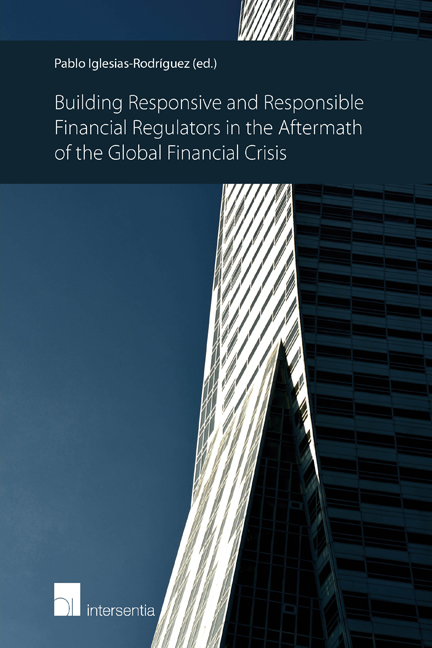Book contents
- Frontmatter
- Preface and acknowledgements
- Foreword
- Contents
- List of contributors
- Responsive-and-responsible financial regulation in the aftermath of the global financial crisis
- Part I THE CONTRIBUTION OF ACCOUNTABILITY, INDEPENDENCE AND ECONOMIC THEORY TO RESPONSIVE-AND-RESPONSIBLE FINANCIAL REGULATION
- Part II POST-CRISIS ARCHITECTURES OF FINANCIAL REGULATION IN THE EUROPEAN UNION, THE UNITED STATES OF AMERICA AND CANADA: ACCOUNTABILITY AND RESPONSIVENESSAND- RESPONSIBILITY
- Part II. 1 THE EUROPEAN UNION
- Part II. 2 THE UNITED STATES OF AMERICA
- Part II. 3 CANADA
Preface and acknowledgements
Published online by Cambridge University Press: 26 November 2017
- Frontmatter
- Preface and acknowledgements
- Foreword
- Contents
- List of contributors
- Responsive-and-responsible financial regulation in the aftermath of the global financial crisis
- Part I THE CONTRIBUTION OF ACCOUNTABILITY, INDEPENDENCE AND ECONOMIC THEORY TO RESPONSIVE-AND-RESPONSIBLE FINANCIAL REGULATION
- Part II POST-CRISIS ARCHITECTURES OF FINANCIAL REGULATION IN THE EUROPEAN UNION, THE UNITED STATES OF AMERICA AND CANADA: ACCOUNTABILITY AND RESPONSIVENESSAND- RESPONSIBILITY
- Part II. 1 THE EUROPEAN UNION
- Part II. 2 THE UNITED STATES OF AMERICA
- Part II. 3 CANADA
Summary
The global financial crisis that started in the year 2007 has shown how the failures in financial regulation and supervision may have extremely harmful consequences for the protection of investors, the soundness of the financial markets, the stability of the financial system and, ultimately, social well-being.
The architects (scholars, practitioners, policy-makers, legislators, stakeholders …) of the post-crisis structures of financial regulation and supervision face the highly challenging task of building regulators that effectively tackle the weaknesses of the pre-crisis regimes.
This book aims at re-examining central concepts in the governance of financial regulators, in light of the global financial crisis experience. It does so through both a theoretical analysis of the concepts of accountability and independence of the regulatory function, as well as a critical examination of post-crisis financial regulation architectures in the European Union, the United States of America and Canada. The ultimate goal of this volume is to provide policy-makers with ideas that may help them to build financial regulation architectures which are more responsive to the needs and demands of society and to the challenges of increasingly global financial markets.
I owe an immense debt of gratitude to the contributors to this volume for their excellent work and dedication. They devoted substantial time and effort to writing their contributions and updating them to reflect the latest developments. Working with all of them was a very pleasant, inspiring and rewarding experience.
I am very grateful to Luc Verhey, who strongly supported this project from the outset.
I would also like to thank Tom Scheirs for his advice and assistance throughout the publication process, and the two anonymous reviewers of the book proposal for their invaluable comments.
The Faculty of Law of the VU University Amsterdam and the Global Governance Programme of the European University Institute provided me with very supportive and intellectually rich working environments during successive stages of the editing process. My warmest thanks to them as well.
- Type
- Chapter
- Information
- Building Responsive and Responsible Financial Regulators in the Aftermath of the Global Financial Crisis , pp. v - viPublisher: IntersentiaPrint publication year: 2015



